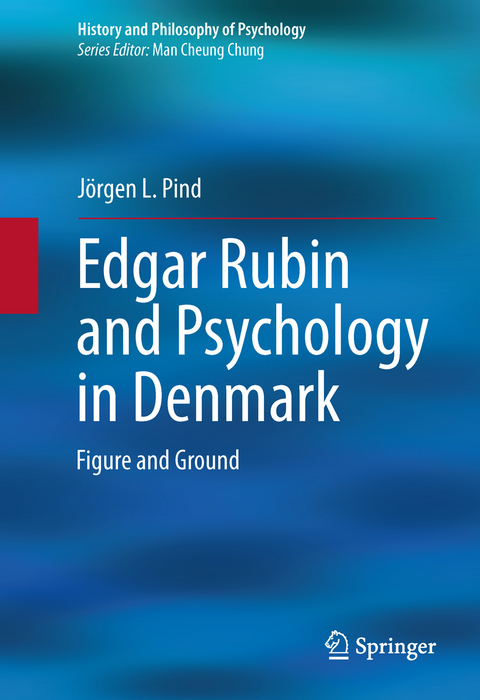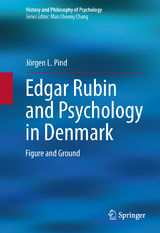Edgar Rubin and Psychology in Denmark
Springer International Publishing (Verlag)
978-3-319-01061-8 (ISBN)
Jörgen L. Pind is a professor of psychology at the University of Iceland. After a career in experimental psychology, he worked on the History of Psychology for the past 7-8 years, writing one book and a number of articles. He has spent two sabbatical terms at the Institute of Psychology at the University of Copenhagen, where he researched archival sources dealing with the history of psychology in Denmark, in particular relating to Rubin. He speaks and reads Danish fluently having been brought up bilingually in Danish and Icelandic. He studied in England (MSc and DPhil in Experimental Psychology, University of Sussex) and spent 1993-1994 as a visiting scientist at MIT.
1. Growing up in Copenhagen.- Copenhagen, 1833.- Jews in Denmark.- Family and early years.- Education.- Gazing into the heavenly light.- 2. Psychology without a soul.- The lure of metaphysical longings.- A bon papa sort of man.- A quality of familiarity.- Food for thought.- Tutorials in the Philosophical Factory.- 3. Apprentice in Lehman's Laboratory.- The psychologist dares not experiment on the soul.- The intrepid experimenter.- Aristotle and Socrates in Copenhagen.- Ekliptika.- Paradoxical warmth.- Magister artium.- 4. Triumph and tragedy in academia.- Sympathetic understanding.- Purgatory in Göttingen.- Høffding's last lecture.- Rubin's revolution in perception.- The boat of my soul staggers.- Høffding's successor.- 5. Philosopher or psychologist.- Competing for a professorate.- The metaphysician in overalls.- Lehmann's successor.- The end of an era.- Drawn unto the Gestalt bandwagon.- 6. The aspective psychologist.- Explorations in the human sensorium.- An old-fashioned introspectionist.- Playing the part of your bad conscience.- Popularizing psychology.- Pest over Europe.- A taste for England.- Aspective Psychology.- Occupation, arrest, and the flight to Sweden.- 7. Final years and legacy.- The return from Sweden.- Remembering Rubin.- Rubin and Bohr.- The consummate observer.- Rubin's vase.
"...Edgar Rubin and Psychology in Denmark: Figure and Ground is such a welcome addition to the literature. It presents material that only a writer intimately familiar with the language and customs of Denmark could present. Another reason is that it tells an important story...The author draws on a variety of sources to provide a rich portrayal of academic life in the early 20th century. The recreation of an oral examination in philosophy is spine tingling to read for those of us who have suffered through our own oral exams. Pind describes many of the difficulties facing scholars at the time, including their infighting. The competition among scholars for positions during this period in Denmark was fierce...Pind has given us a volume with a leisurely pace and a relatively narrow national focus. Readers expecting to immediately leap into the life of Edgar Rubin will have to sit back and relax. The author has a larger story to tell. He also takes many side tracks, a style that can be intriguing at the same time that it is frustrating. About Rubin himself, the story tells us that the figure-ground phenomenon, for which he was most famous, was about so much more than the figure of a vase. It became the model that infused much of Rubin's research during a long and influential career."
John D. Hagan
PsycCRITIQUES
January 27, 2014, Vol. 59, No. 4, Article 1
"Pind's well-researched book provides an insight into the confined world of philosophy and psychology at the University of Copenhagen in the period from the late-19th to the mid-20th century. His accounts of Rubin's Visually Experienced Figures will broaden the appreciation of a seminal work in the history of perception for English readers."
Nicholas J Wade School of Psychology, University of Dundee, Dundee DD1 4HN, Scotland, UK
Perception, 2014, volume 43, pages 595 - 604
"The book is the product of very dedicated and persistent work with manykinds of materials (yearbooks, letters, many different kinds of text genres, interviews, etc.). This is history of science at its best, and Pind tries with success to avoid undocumented rumors and its like. The primary focus is on Rubin's scientific development and the necessary sources to describe this with. It is done in a very serious and informative way. The book will be a standard work for anyone interested in Edgar Rubin and the scientific investigation of perception."
Simo Koppe, Department of Psychology, University of Copenhagen, Denmark
Journal of the History of the Behavioral Sciences, Vol. 51(2), 231-232
| Erscheint lt. Verlag | 19.8.2013 |
|---|---|
| Reihe/Serie | History and Philosophy of Psychology |
| Zusatzinfo | X, 228 p. |
| Verlagsort | Cham |
| Sprache | englisch |
| Maße | 155 x 235 mm |
| Gewicht | 496 g |
| Themenwelt | Geisteswissenschaften ► Philosophie ► Geschichte der Philosophie |
| Geisteswissenschaften ► Philosophie ► Philosophie der Neuzeit | |
| Geisteswissenschaften ► Psychologie ► Allgemeines / Lexika | |
| Geisteswissenschaften ► Psychologie ► Klinische Psychologie | |
| Naturwissenschaften | |
| Schlagworte | Aristotle • aspective psychology • David Katz • Edgar Rubin • figure and ground • Gestalt revolution • History of psychology • Lehmann's laboratory • perceptual psychology • Psychology in Denmark • school of phenomenology • schools of psychology • Socrates |
| ISBN-10 | 3-319-01061-1 / 3319010611 |
| ISBN-13 | 978-3-319-01061-8 / 9783319010618 |
| Zustand | Neuware |
| Haben Sie eine Frage zum Produkt? |
aus dem Bereich




